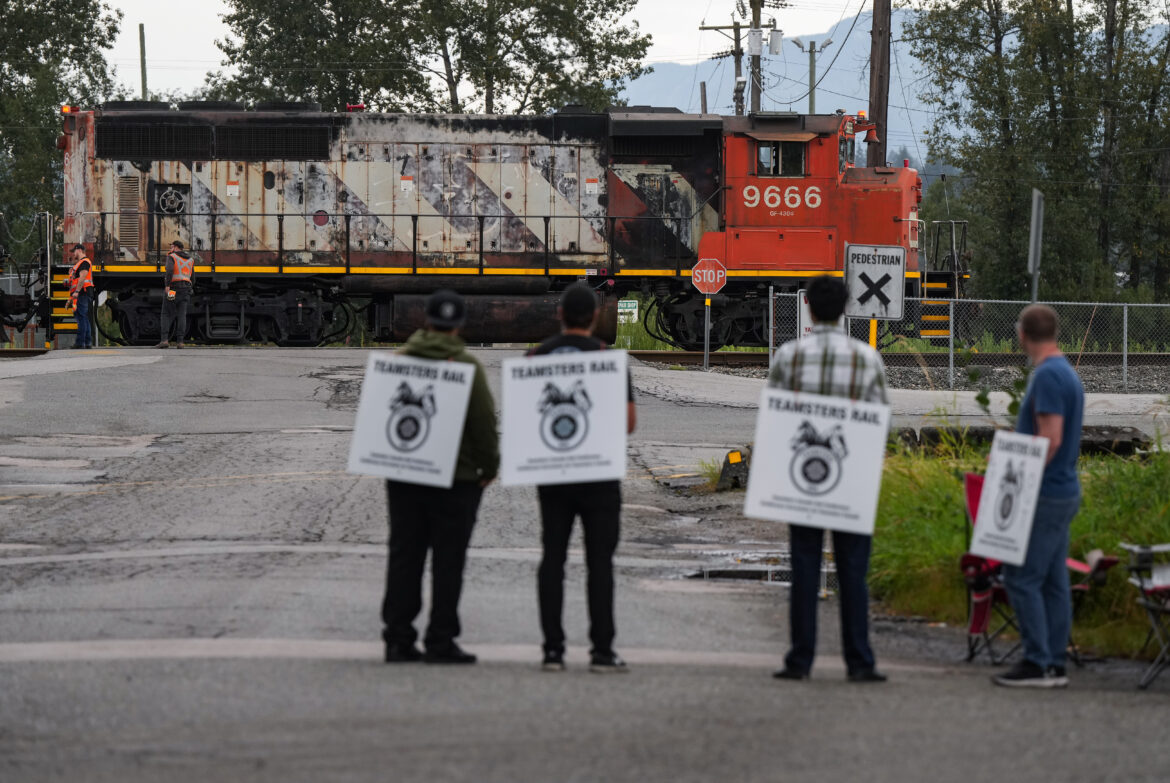Rail workers pushed back hard Friday against the federal government’s move to get them back on the job, with a new strike notice and a regulatory challenge making it unclear when freight traffic will fully resume.
At Canadian National Railway Co., trains began to move again Friday morning as workers started to trickle back to work — even as the Teamsters union issued a 72-hour strike notice against CN shortly before 10 a.m. EDT.
And at Canadian Pacific Kansas City Ltd., the union has challenged a directive for binding arbitration issued by Labour Minister Steven MacKinnon to the country’s labour board.
A work stoppage at both national railways prompted MacKinnon to ask the Canada Industrial Relations Board on Thursday to use the mechanism, aimed at resolving an impasse that has halted freight shipments and snarled commuter lines across the country.
The labour board summoned the parties to a meeting Thursday night, followed by a hearing Friday morning.
The tribunal said in an email it is addressing the issue “with utmost urgency.” A decision is expected later in the day.
Pickets continue at the head office of CPKC in Calgary and those on the line received a visit from Francois Laporte, the national president of Teamsters Canada Friday morning.
Laporte and Sean O’Brien, the general president of the International Brotherhood of Teamsters arrived in a black semi truck, its horns blaring, with Teamsters written on the side.
O’Brien called the lockouts by both rail companies “a disgrace.”
“This is not over. I’m telling you this is not over. The struggle continues,” Laporte said to about 70 people who were on hand.
Before making the binding arbitration directive, the labour minister had faced pressure to intervene from business groups, which warned of the economic consequences of the work stoppage and urged Ottawa to break the deadlock and kick-start freight service.
At a Thursday news conference, MacKinnon said the government is “committed totally to collective bargaining,” but said the impacts of the shutdown are being felt by all Canadians.
The government gave the negotiations “every possible opportunity to succeed,” he said.
Each side had accused the other of failing to negotiate seriously, with wages and scheduling as key sticking points. The union had said it rejected binding arbitration, framing Ottawa’s decision as a move to “sidestep” it.
“Despite claiming to value and honour the collective bargaining process, the federal government quickly used its authority to suspend it, mere hours after an employer-imposed work stoppage,” said Paul Boucher, president of the Teamsters Canada Rail Conference, in a release Thursday evening.
The union has said both companies are pushing to weaken protections around rest periods and scheduling. It says CN also seeks a scheme that would see some employees move to far-flung locations for several months at a time to fill labour gaps.
CN pushed back on Friday, saying the Teamsters are “holding Canada hostage to their demands.”
“CN is focused on recovery in order to resume powering the economy. The Teamsters are focused on returning to the pickets and shutting everything down again,” said spokesman Jonathan Abecassis in a phone interview.
In Calgary, Laporte said he understood that the Teamsters at CN gave 72 hours strike notice this morning and as far as he’s concerned the dispute will continue.
“Our people are still on strike. We’re still on the streets so our operation will not resume. It is not going to be business as usual for both companies.”
O’Brien said the International Teamsters fully support their Canadian colleagues.
“Corporate greed is running rampant,” he told reporters at a picket outside CPKC headquarters in Calgary on Friday morning. “Reward these workers with what they have earned. But also don’t try to diminish safety.”
“What’s important here is not to lose sight of the fact of who caused this problem right now. They chose to lock these workers out,” O’Brien said.
“We got your backs 100 per cent.”






